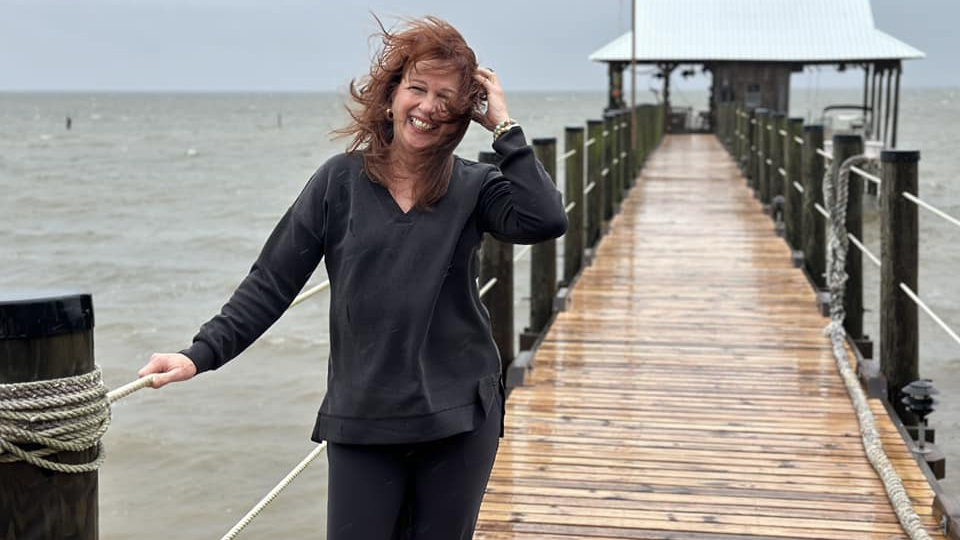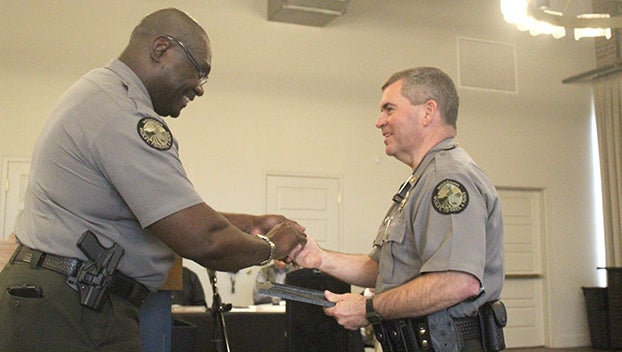‘Just live your life’ — Cancer survivor says it’s been a great life
Published 12:00 pm Saturday, October 7, 2023

- PHOTO SUBMITTED Cathy PIgott
Brookhaven native Cathy Pigott has always just lived her life.
“So many people start living their life after they find out they’ve got cancer,” she said. “I already lived life. It didn’t take cancer to make me start learning to live life.”
Pigott was diagnosed with breast cancer in 1999, when she was 39. Her mother had battled breast cancer at age 54.
She and her husband Donald were en route from Hawaii to Ft. Jackson, South Carolina, where he had been transferred in the U.S. Army. She felt a knot, so visited her family doctor in Brookhaven, Dr. Jewell Breeland. A mammogram showed it was a benign cyst. Ten months later, she had a physical at Ft. Jackson, and though the knot was gone and Pigott felt great, “I felt in my gut something was happening.”
So she asked the nurse practitioner to look at her medical records and do another mammogram.
The results revealed “something suspicious,” so they repeated the test and saw something there.
“They told me they were 99.9 percent sure it was not breast cancer,” Pigott said. “But I had a family history. Only 20 percent of people who get breast cancer have a family history of it, though. Eighty percent do not have a family history. Somebody’s got to start it.”
Pigott had a biopsy on a Thursday and went for the results the next Tuesday.
“I remember sitting there waiting to be called back and telling Donald that I had breast cancer,” she said. “I don’t know why but I had always felt I would get breast cancer at some point in my life.”
The doctor, a Col. Lipsey, had something on his desk that said, “What is Breast Cancer?”
“I have breast cancer, don’t I?” she asked, to which the colonel answered, “Yes.”
“Col. Lipsey,” I said, “Jesus said He’s not going to put more on us that we can bear.”
The doctor agreed with her and asked if he could take out his Bible and read with them.
“I said, ‘Of course,’ and he did,” Pigott said. Then he offered to let someone else do the surgery she would need.
“‘Who the hell else would I want?’ I asked him. I knew I was in great hands,” Pigott said.
Support
The mother of two said the day she told her children about the cancer was a tough one. It was the hardest speech she’s ever given, and the strongest she’s had to be in her life. She went through 12 rounds of chemotherapy and it was very difficult for her young children.
“My daughter didn’t turn off the lights for a year because she didn’t want to be in darkness, because she thought of death,” said Pigott. “One morning my son was very upset and I asked him what was wrong. I hugged him and put my hands on his face and turned it up toward mine. He said, ‘If you die, who’s going to help me with my homework?’ When he walked out, I slid down the wall and cried out to Jesus.”
Her husband was very supportive throughout the treatments, her decision to have a double mastectomy with no reconstructive surgery, and all that came along with the breast cancer.
“He was the best husband — probably the best of the best with that,” Pigott said. “After the double mastectomy, I woke up and he was rubbing my head. I watched his face as he unwrapped my body that was now very different. He looked at me and said, ‘Girl, this doesn’t look bad at all.’ Not many people have a love like that.”
But a 29-month tour in Iraq during the Iraq War changed Donald and he “was a dead man walking when he got off the plan coming home to us,” Pigott said. “His service became another war. The breakup of a family is worse than any cancer that can ever be given to you.”
A tough time
In the years since, Pigott has had several friends very close to her who have battled breast cancer. She was an encourager to each. If they needed a mastectomy, she encouraged them whether they chose to have reconstructive surgery or not.
“If women need that, I’m for that, but it wasn’t something I needed,” she said. “You make your own choice.”
When she took chemo, it was in an Army hospital with six other cancer patients. They sat in the same room facing each other as they underwent the treatments. It was not easy for her. She saw a lot of humble people, and one man very angry at God.
“It was a tough time. I was the only one who survived. I watched them die in six months,” Pigott said. “At the end, it was me, age 39, and a black woman who was 54. I don’t know why, but black women have a higher percentage of dying with breast cancer. It was our last day to have our treatments. I was so excited she and I both made it. I told her, ‘We made it!’”
“She looked very happy for me, and I knew something was wrong,” Pigott said, her voice breaking with emotion. “They had done another test on her. It was in her liver, and she died shortly thereafter. I thought she had made it.”
During the treatments, I kept smiling because at that moment I was young, compared to them,” she said. “I was born to be a cheerleader in life — with football, with life, and with breast cancer. And I’m standing at the window on the 12th floor of the hospital, getting ready to start chemo the first day, and I’m watching people outside. The world keeps going.”
Pigott thought of her children and husband, whom she adored, and felt she was in God’s hands through it all.
“If things didn’t happen to us, we couldn’t get as close to Jesus,” she said. “We can be close to Him in the good times, but when you need Him, it’s just such a different feeling with Him. It’s a miracle that at that moment I never felt pity for myself. I just thought I’ve got to do this, and hope I survive it.”
A matter of trust
Pigott encourages women — and men, because they can get breast cancer, too — to trust their gut feelings, to trust nurses and nurse practitioners, and to be persistent.
“They told me if I hadn’t been so persistent with the mammogram, it would have taken 18 months to find (the cancer), and I wouldn’t have made it,” Pigott said. “When you first get cancer, if you let everything that hurts bother you, you’d probably go insane. You have to move on with your life. It’s OK to have a little pity party every now and then for yourself, but just think about keeping going.”
But her biggest advice to others is to not wait until they have a cancer diagnosis to start really living their lives.
“The dance floor felt no different to me before I got cancer than after. I do like that about myself,” Pigott said. “I can hear my laughter; I can feel my tears; and I can touch my heart. I know a happy heart and I know a broken heart — it still beats. I’ve lived my life. It’s been a good life, a great life.”





